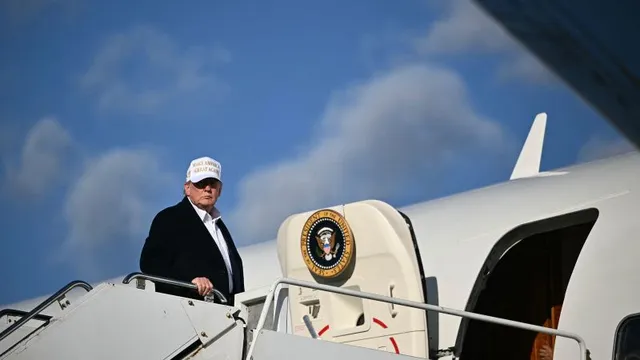
Trump accepts Qatar's offer of a Boeing 747 as temporary Air Force One
2025-05-16 10:54- Donald Trump expressed disappointment over delays in acquiring a new Air Force One from Boeing, stating the current model is outdated.
- He praised Qatar's offer of a Boeing 747 as a temporary Air Force One while the new aircraft is constructed.
- The proposal has faced criticism from opposition lawmakers for potential constitutional issues and concerns over foreign influence.
Express your sentiment!
Insights
On May 12, 2025, U.S. President Donald Trump publicly addressed the situation regarding aircraft used for presidential travel, specifically criticizing delays in the production of a new Air Force One by Boeing. He noted that the current aircraft is 40 years old and highlighted that Qatar's royal family had made a significant gesture by proposing to gift the United States a Boeing 747 for temporary use while the new fleet was under construction. Trump's remarks came during a press conference where he voiced disappointment in Boeing's inability to deliver the aircraft on schedule. Trump emphasized that this offer from Qatar was very much appreciated and characterized it as a reasonable response to the ongoing delays. The president stated that accepting such a donation would be smart, especially given the high costs associated with maintaining military aircraft. His comments were framed as part of broader discussions regarding defense financing, military partnerships, and international relations. The potential acceptance of the aircraft stirred political controversy, particularly among opposition lawmakers who argued that receiving a jet from a foreign government could raise ethical concerns or suggest undue foreign influence over U.S. affairs. Lawmakers called for stricter oversight and adherence to constitutional guidelines regarding gifts from foreign entities. Despite this backlash, Trump defended the decision and mentioned that the transaction would be transparent, compliant with legal regulations, and would not involve any quid pro quo arrangements. White House Press Secretary Karoline Leavitt reiterated that all gifts from foreign governments are reviewed for legal compliance and scrutinized to ensure they align with national interests. The situation reflects ongoing tensions in U.S. defense procurement and the complexities of balancing foreign relationships with domestic political scrutiny.
Contexts
Qatar's relationship with the United States has evolved significantly over the years, marked by strong military cooperation and economic ties. The foundation of this partnership was established in the late 20th century, with Qatar's strategic location providing the U.S. military with a vital regional foothold. The Al Udeid Air Base, home to the largest U.S. military installation in the Middle East, is a focal point of this cooperation, allowing the U.S. to conduct operations throughout the region while ensuring Qatar's national security. This military collaboration has solidified Qatar's role as a key ally in U.S. foreign policy, especially concerning counterterrorism efforts and regional stability amidst ongoing conflicts in the Middle East. Economic ties further enhance U.S.-Qatar relations, as Qatar is one of the largest exporters of liquefied natural gas (LNG) to the United States. This energy partnership not only strengthens bilateral trade but also contributes to global energy security. In addition to energy, both nations have engaged in various sectors, including defense contracts, technology, and finance, bolstering economic interdependence. The establishment of the Qatar-U.S. Business Council has also facilitated dialogue and collaboration between the private sectors of both countries, fostering investment opportunities and entrepreneurship. Cultural and educational exchanges play a crucial role in deepening the understanding and mutual respect between the two nations. Initiatives such as the Qatar Foundation and various academic partnerships encourage collaboration in research, innovation, and education. American universities have established campuses in Qatar, promoting a shared commitment to education and liberty. These exchanges not only enrich the communities involved but also serve to strengthen the overall relationship between Qatar and the United States. However, the relationship is not without its challenges. Qatar's ties with other regional powers, including Turkey and Iran, sometimes create friction with U.S. interests in the region. Nonetheless, ongoing diplomatic efforts and a shared vision for security and prosperity continue to drive the partnership forward. By addressing mutual strategic goals and fostering close military and economic cooperation, Qatar and the United States are poised to navigate the complexities of their alliance while contributing to regional and global stability.